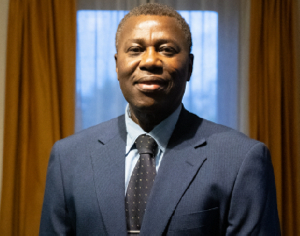The Host of Good Morning Ghana on Metro TV, Dr Randy Abbey, could not hide his displeasure at an assessment by the Danquah Institute on which government in the Fourth Republic has accrued the most debts.
The Danquah Institute, a policy think tank, asserted that the opposition National Democratic Congress (NDC) is more responsible for the country’s outrageous debt overhang than the ruling New Patriotic Party (NPP).
Reacting to this on his program on Thursday, April 18, 2024, Dr Abbey rubbished the assessment of the institute.
He indicated that the reasoning given by the institute for its assessment did not make sense and was full of misrepresentations.
“Danquah Institute, NPP has managed Ghana's debts better. You guys just can't help getting people upset and angry every day.
“And I read the analysis. I couldn't just believe the level of intellectual dishonesty in this analysis that has been made. Even in the face of DDEP (Domestic Debt Exchange Programme), you have the nerves to speak like this,” he said.
The reasons the Danquah Institute gave for its assessment:
In a second edition of the Institute’s planned monthly media encounter held on Wednesday, April 17, 2024, the Head of Research of the policy think tank, Dr. Frank Bannor, pointed out that, following the attainment of the HIPC completion and external debt relief, Ghana witnessed a remarkable decline in its public debt to GDP ratio; from 182% in 2000 to 32% by the end of 2008, under the John Agyekum Kufuor administration.
Using statistics and data from the Bank of Ghana and the Ministry of Finance, he explained that the public debt, which was recorded at $8.07 billion in 2008, skyrocketed to $29.2 billion by 2016, indicating a more than threefold increase.
This surge, he said, propelled the debt-to-GDP ratio to 73.1% by the close of 2016. He stressed that this represents a growth rate, or an increase of about 261.83% in the total public debt stock under the NDC, from 2009-2016.
Dr. Bannor stressed that this rate of change indicates that on average, the NDC government added 32.75% debt to Ghana’s debt stock every year between 2009 to 2016.
He added that this trajectory was even worse between 2012 and 2016.
"The public debt, which stood at $15.3 billion in 2011, increased to $29.2 billion by the end of 2016, indicating a growth rate of 90.85% from 2012 to 2016," he pointed out.
According to him, the public debt, which stood at $29.2 billion in 2016, had increased to $51.04 billion as of the end of 2023.
TWI NEWS
He maintained that contrary to public perception, this marks a little over one-and-a-half percent increase in the overall public debt stock under the NPP. This rate of change, he mentioned, represents an increase of about 74.79% in the total public debt stock, compared to a growth of 262% from 2009 to 2016.
He indicated that unlike the trajectory between 2009 to 2016, the NPP, on average, has added about 10.68% to Ghana’s debt stock every year between 2017 to date, which he said is far lower than the 32.75% witnessed under the NDC.
"We employ the US dollar in our analysis due to its status as the world's primary reserve currency, and its widespread usage in international trade. Furthermore, the US dollar is recognized for its stability, maintaining its unit of account and purchasing power consistently over extended periods," he said.
He mentioned that foreign currency debt carries an exchange rate risk.
“This implies that the debt stock in local currency terms could even rise with no new borrowings," he stated.
For example, he pointed out that the public debt of $29.2 billion in 2016 would have been the equivalent of about GH¢380 billion today, without any additional borrowing.
Watch Dr Randy Abbey's remarks below:
Randy Abbey appropriately excoriates the NPP propagandists posing as think tanks and spewing utter nonsense about the economy.Anyone who tells you this government ,that has defaulted on debt and has given over 1.3 million bondholders a collossal GHS 130 billion financial… pic.twitter.com/GTTEBqkvug
— Felix Kwakye Ofosu (@FelixKwakyeOfo1) April 18, 2024
BAI/AE
Watch the latest episode of Everyday People on GhanaWeb TV below:
Ghana’s leading digital news platform, GhanaWeb, in conjunction with the Korle-Bu Teaching Hospital, is embarking on an aggressive campaign which is geared towards ensuring that parliament passes comprehensive legislation to guide organ harvesting, organ donation, and organ transplantation in the country.













